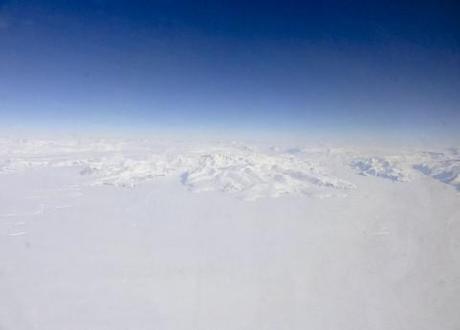
Life under the ice? Researchers hope to find never before seen viruses, bacteria and fungi. Photo credit: US Embassy New Zealand http://www.flickr.com/photos/us_embassy_newzealand/5245064777/
After 15 years’ preparation, a bold British expedition is gearing up to search for life buried deep under the Antarctic ice, in Lake Ellsworth, the BBC reported. There are 387 sub-glacial lakes on Antarctica, and so far nobody has managed to access them. They present an exciting scientific frontier – totally isolated for millennia, these lakes may contain new forms of life we’ve never seen before.
Epic engineering. Accessing the lake presents a major engineering battle. The lake lies beneath 3km of hard ice. It is kept liquid by natural geothermal heat rising from the Earth’s core. The expedition will aim to drill through the ice and obtain a sample of the lake’s water, and the sediment at its base. The drill they plan to use is “basically a spraying device on the bottom of a hose 3.2km long.” It will use boiling hot water to carve through the ice, but the mission will be a “race against time,” with the freezing temperatures meaning that the water at the edges of the borehole will rapidly freeze. The probe must get in and out in just a few hours. “For almost 15 years, we’ve been planning to explore this hidden world. It’s only now that we have the expertise and technology to drill through Antarctica’s thickest ice and collect samples without contaminating this untouched and pristine environment”, Professor Martin Siegert told the Independent.
“Any form of life we find there, we won’t have encountered before”, said David Pearce.
New life. The organisers have high hopes for the work. “If we’re successful, we’ll make profound discoveries on both the limits to life on Earth and the history of West Antarctica”, Siegert told BBC News. Totally isolated from the rest of the world, life in the enclosed lake system will have undergone independent and unique evolution, and could provide vital information about early life on Earth, and the limits of life. Reuters reported that Dr David Pearce said, “finding life in a lake that could have been isolated from the rest of the biosphere for up to half a million years will tell us so much about the potential origin of and constraints for life on Earth, and may provide clues to the evolution of life on other extra-terrestrial environments.”
Climate change clues. The expedition also wants to find out how likely the West Antarctic Ice Sheet is to melt as global warming raises the earth’s temperature. By assessing whether it has melted before, the scientists will be able to determine how the colossal ice sheet might behave in the future.

